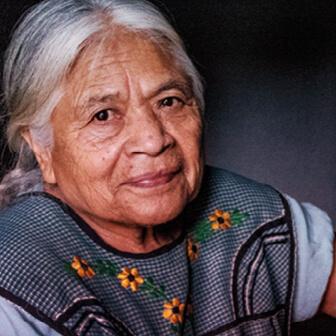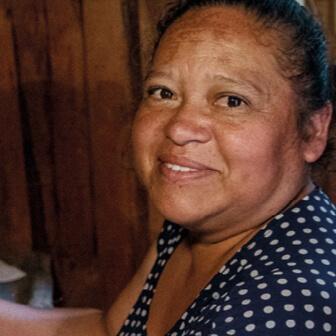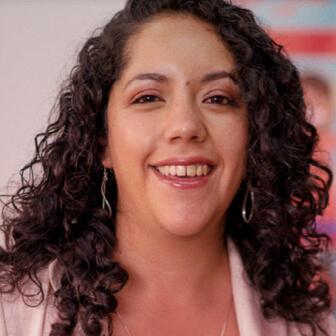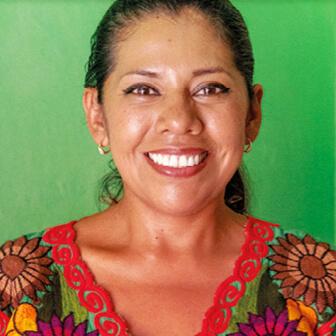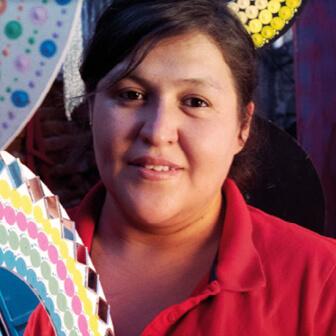The Velasco & Patterson Society Kicks Off 1st Annual Campaign with Former Federal Reserve Chairman and Pro Mujer Senior Advisor, Paul A. Volcker
5 diciembre, 2011
Blog, Breaking News, Events, Partners
By Joshua Cramer-Montes, Director of Communications, Pro Mujer
“I’ve been on a four-year mission to find some financial institution that’s honest and solid and has a clear sense of public mission, and that’s why I found [Pro Mujer].” – Paul A. Volcker
On Tuesday, November 29th, 2011, The Velasco & Patterson Society kicked off its 1ST annual campaign with a special event hosted by Rosemary Werrett, a member of Pro Mujer’s Board of Directors and Chair of The Velasco & Patterson Society, and her husband Noel. The event, which was held in their home in New York City, also celebrated its Founding 100 members.
The Society is named after Pro Mujer’s Co-Founders Lynne Patterson and Carmen Velasco. It is the philanthropic leadership body that works with the organization to secure unrestricted funding in order to maintain and expand the impact that Pro Mujer is having on women in Latin America. These funds will help support our holistic and multidimensional package of services which includes microfinance, business and empowerment training and high-quality, low-cost primary health care.
The evening’s special guests were Paul A. Volcker, former Chairman of the United States Federal Reserve under Presidents Jimmy Carter and Ronald Reagan, and his wife Anke. Most recently he was Chairman of the Economic Recovery Advisory Board under current President Barack Obama from February 2009 until January 2011.

From L to R, Pro Mujer Chief Executive Officer Rosario Pérez, Rosemary Werrett, Paul A. Volcker and Carmen Velasco
Other distinguished guests included: Bill Rhodes, Senior Advisor for Citi and author of “Banker to the World: Leadership Lessons from the Front Lines of Global Finance;” Pro Mujer Senior Advisor Ernest Stern; and members of Pro Mujer’s Board of Directors. Joining them were approximately 50 people including many long-time friends and members of The Velasco & Patterson Society.
In her opening remarks, Rosemary explained how she became involved with Pro Mujer, and then introduced Carmen who inspired everyone with a few words reminding us why we were all gathered there that evening. Carmen said:
“I remember the day we first met with the women we were helping in El Alto. I remember the urge they had to be heard, to have something in which they could believe. We could never have imagined that the seed that we planted more than 20 years ago, was going to grow in such a way that was not only going to succeed in Bolivia but become a model for countries throughout Latin America…to help transform the lives of more than a million women and their families. There are so many more women that need and want the life changing opportunities that Pro Mujer provides. That’s what gives us a renewed sense of urgency today.”
Rosario followed Carmen’s words by providing her vision of Pro Mujer’s future and how unrestricted giving will help make that vision a reality by saying, “We want to pursue key strategic growth opportunities that will amplify our palate of services at a lower cost to our clients and increasing our impact. Unrestricted funding is one of the cornerstones of that strategy.”
She went on to cite a recent Stanford Social Innovation Review article titled, “The Power and Pleasure of Unrestricted Funding” written by Kevin Starr, Managing Director of The Mulago Foundation. In it, Kevin writes, “Unrestricted money makes an organization work smoothly, enables innovation, and provides fuel for growth. It unlocks potential and allows people to get down to business and do what they’re best at. It makes it possible for great organizations to weather crises without losing momentum.”
The highlight of the evening was a provocative, yet often humorous fireside Q&A between Paul, who together with his wife Anke are Velasco & Patterson Society members, and Lynne. Below is an excerpt from their conversation:
Lynne: I have to say that I have been looking forward to this evening for a long time and I’m very grateful for Anke and Paul being here. Their support means the world to me; I am a huge fan of theirs. Their endorsement of Pro Mujer is very compelling given the decades they’ve both worked in finance, Anke, behind the scenes, and Paul, out front and center. So to have them sitting here is a great thrill to me, and I thank you. You don’t need any introduction but people are really here to hear you.
Paul: I don’t want all these people here to be in some misapprehension, let me explain why I’m here.
L: Please do.
Paul: I’ve been on a four-year mission to find some financial institution that’s honest and solid and has a clear sense of public mission, and that’s why I found you. (applause)
L: Well you know, I hope somebody’s writing that down…(laughter) Well thank you very much… Given your financial background, and the state we’re in, I know that you have been supporting a reset of the rules for finance and that you are urging our political leaders to apply this reset to commercial and non-bank financial institutions. In a recent article, you said that we don’t have so much time, but that you thought that we did have time if we did the right thing. This was a few months ago so I really want to ask you, where do you think we are now?
Paul: Well this is some deep stuff. (laughter)
L: I did my homework.
Paul: I don’t want to disillusion you but we’re not much different than we were two months ago. It’s been a bit of a struggle. We have had a certain amount of resistance in this city and elsewhere that we really have had a breakdown of the financial system not just in the United States but around the world. We got off on the wrong path for a number of reasons. It wasn’t only the fault of the financial system – the financial system did break down – I think it needs a good dose of common sense and change. We have this very complicated Dodd-Frank bill that gets criticized but it had some essential pieces in it. One little piece was somehow named after me, which we certainly want to defend. (laughter).
But I don’t think the job is complete yet. We’ve got this great problem of “too big to fail” and we’re not going to deal with that without international consistency, which we don’t yet have, but there is some work going on there. We have a broken mortgage market. We’re so proud of our mortgage market and everybody in the United States should get a mortgage. We generalized that a bit too far. We now have a government control mortgage market which we don’t want to live with and that’s going to take years to return to good private operation. There are lots of complaints about the credit rating agencies, complaints about accounting, but there are still a lot of things to do. I hope people don’t lose some sense of momentum in getting them done.
L: Could I ask you, are you still optimistic?
Paul: I’ll tell you, my optimism has been tested lately! (laughter) We have difficult times in the financial markets, but we have bigger problems. I grew up—many of you grew up—in an age where the US was the leader of the world, no question about that. We had the energy, we had the commitment to make things better. Not everyone agreed, but most people believed the United States had a constructive role to play. I think that’s changed in the sense that the United States has become weaker—too much consuming, too little savings.
And other countries have grown up, and that’s wonderful in some ways. God knows how many hundreds of millions of people have been taken out of poverty. In China alone in recent years, and Latin America in the last few years. Of course that’s not all because of Pro Mujer (laughter). A lot of things have happened for the better, but this country is not in the position of having the same kind of leadership it once had, and that worries me because I don’t see anyone else doing it. Nobody else is capable of doing it. So we’re living in a more uncertain world in some ways. There’s the potential breakdown in Europe which is disturbing. In the good old days we might have had something to say to help that situation. But now when we’re broke, how do we help somebody else who’s broke? This is a more difficult time.
L: It is a difficult time. It seems there’s not a will to work together. But for those of us in this room, who really do care about creating a safer and saner world, what would you suggest that we keep in mind? What guidelines would you give us?
Paul: Well, one quality here and elsewhere is patience. We’re not going to get rid of this messy economic situation in a hurry. There’s too much debt out there and it will take a long time to resolve the problems. There’s too cheap savings, we’ve got to restore the savings. And there are a lot of concerns about social security and medicare, which we can’t afford under the current trajectory. These are solvable problems, but are we willing to solve them?
In the political system now, to a degree I’ve never seen before, I don’t think any of us have ever seen before… I don’t recall the bitterness and differences we’re hearing now. And of course, those circumstances were more difficult—in the middle of the great depression.
How can we restore some sense of cohesion, some sense of purpose? Other than consumption, spending. We’ve lost track of it.
L: That’s the question.
Paul: You’re supposed to tell me! (laughter) Here you are, you and Rosario and Carmen and the great American tradition—
L: It almost seems we should apply the solutions outside of the United States—it’s almost harder here, some of our problems are more intractable.
Paul: There are a lot of people who want to come to the table and have a say in how the world is run and that’s understandable. When you have that situation a lot of people want to get in on the action, but how do you solve it? It’s hard to have cohesion in the middle of all those opinions. We see that in Europe now, a relatively cohesive society.
So how do we run this world? I do hope the United States can get through this difficult period and reassert some ability for constructive leadership. We spend as much in defense as all the developed nations in the world and still feel insecure. Maybe too much. We’re not going to solve it just by military expenditures. This little dream I have of the way things used to be—they never were the way I dreamed.
L: But they were different.
Paul: I do think the divisiveness is greater. Even Vietnam, there was a split in the country apart from Vietnam, the country was going in the wrong direction. How did we get through that?
L: I want to thank you for summarizing the situation we face today, and for your leadership and the wisdom you’ve brought to the table.
Paul: I was a great supporter of President Obama, still am. Let me point out it’s not easy to be the president in this inherited economic situation. He stepped into a situation where the opposing party is just dead set against doing anything that the administration wanted. I don’t know where that 60 votes in the Senate came from, well, we do know where it came from, but the idea that you need 60 votes to do anything in the Senate is not a concept—well, it was always possible in the rules of the senate, but nobody pushed it that way, except for a few issues that had immense support, went to very deep set feelings about social development or otherwise. They didn’t push it in ordinary economic circumstances or run of the mill legislation, but now they do and it’s just indicative of the kind of immobilization for any president to face.
L: Well, we’re grateful for your voice and that you’re still writing, still a voice—
Paul: Well, I’m getting older anyway. That’s an accomplishment! (laughter)
L: Well, it is an accomplishment and it’s an inspiration. Thank you so much for coming…
Paul: I can’t help but be impressed with this organization that you have led, and that your associate (Rosario) has led! I don’t know where she came from, but you’re not supposed to have that kind of energy! (laughter) But there you are.
L: Thank you very much, it is touching and just being here is very moving for me. I have to tell you it is the deepest satisfaction anyone could have. You are my family. I have my daughter Lydia here, and she can testify she doesn’t get enough attention—
Paul: Come, Lydia, I want to introduce you to your mother! (laughter)
L: And I want to say, we have some very distinguished guests here with us—Bill Rhodes, where’s Bill? I just read his book, Banker to the World.
Paul: You did read the book!
L: This man was everywhere there was a problem, finding solutions. And Ernie Stern, a great supporter, a member Emeritus of the Group of Thirty and I’m so happy that he’s here.
Paul: These people are representative of whom I’m talking about—moving in a constructive way, the same kind of influence in bringing banks together. They’re all over the world, dealing with whatever crisis of the moment. And Ernie of course—
Ernie: I didn’t do that much. (laughter)
L: And I don’t want to overlook Anke, Paul’s wife, because very smart men listen to their wives—(laughter) it’s another feather in their cap!
Having reached its goal of 100 new members in 2011 and as part of its overall campaign, The Velasco & Patterson Society is looking to increase its total number of members to 200 by 2012.
For more information on how you can get involved, please contact Jason Wu, Director of Development, Individual Giving at jason.wu@promujer.org or at (646) 626-7000, x108.
